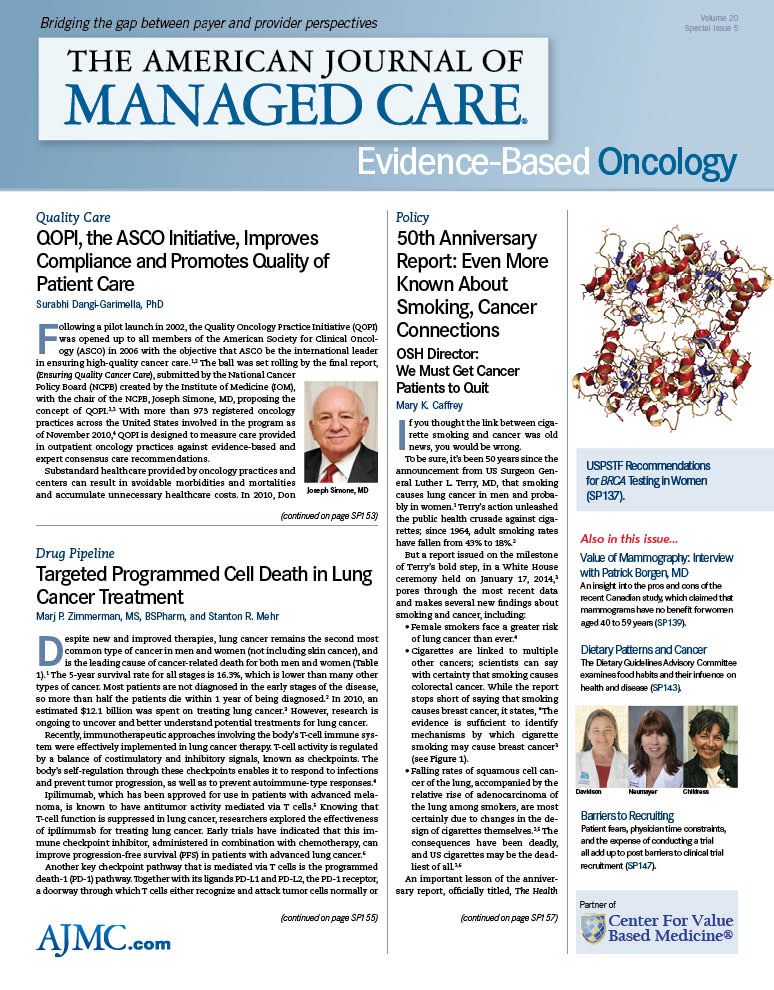- Center on Health Equity & Access
- Clinical
- Health Care Cost
- Health Care Delivery
- Insurance
- Policy
- Technology
- Value-Based Care
A New Concept to Broaden Access to Molecular Testing
During a 2013 discussion on treating non-small cell lung cancer, a group of oncologists from academic medical centers were asked what share of cancer patients have access to molecular testing. The answers varied: One said he guessed 40% to 50%, another said “a large minority.” Anne S. Tsao, MD, director of the mesothelioma program at MD Anderson Cancer Center, University of Texas, said surveys put the share at about 25%, in contrast with National Comprehensive Cancer Network guidelines that suggest “all of them” should be tested.1
Why the gap? Mark A. Socinski, MD, director of the lung cancer section at the University of Pittsburgh, said that while things are changing, “At the community level there are a number of barriers” to molecular testing. In community practices, Socinski said, there’s not a pathology department to handle testing, so it’s all on a busy oncologist to get testing done—and reimbursement may be a challenge.
Within a month of that discussion, 2 entrepreneurs in McLean, Virginia, set out to address barriers to molecular testing at the community level, and in turn help take both oncologists and their patients to the next step in personalized medicine: not just using a molecular test to match the drug to the patient, but to ensure that the right combination of genetic or proteomic tests has been performed, so that the oncologist has best information available to guide treatment.
Perthera, which is short for Personalized Cancer Therapy, seeks to find its niche by helping what it calls “the busy oncologist” facilitate all phases of molecular testing: collecting tumor samples, deciding what tests would be helpful, getting them ordered, and creating a report for the oncologist. If an ideal therapy for the patient’s cancer is not approved, Perthera will try to connect the patient with a clinical trial.
“We provide an interpretive service,” said Michael Pishvaian, MD, PhD, chief medical officer, and an assistant professor in hematology and oncology at Lombardi Comprehensive Cancer Center, Georgetown University. “We don’t want to get in the way of the testing companies; in fact, we scour for the best testing companies.”
A scientific distinction of Perthera is that it does not limit recommendations to genomic testing but also includes proteomics, or testing of proteins, which is the expertise of company cofounder and Chief Scientist Emanuel F. Petricoin, PhD2 (see related story, page SP149). But it’s the aspect of Perthera’s service that would appear most helpful to community oncology—handling all reimbursement—that presents a conundrum for patients. While part of Perthera’s appeal is that it helps patients negotiate with insurers, its own services—all that legwork that would otherwise be absorbed by the community oncologist —are not yet covered by insurance. At the moment, fees are $5800, according to Dave Anderson, a spokesman for the company.
That amount may seem high, but it pales compared with the out-of-pocket cost of many of today’s cancer therapies, particularly those for patients suffering later stage or difficult-to-treat cancers. In an interview, Pishivaian said Perthera was steadily serving patients it met through local oncologists, most of whom were also willing to grant Perthera consent for their tissue to be stored in the company’s biobank for future research. Pishivaian said Perthera plans to publish on the effectiveness of its approach once the company has results from 50 to 100 patients of specific disease types.
Perthera’s approach, of offloading both the headaches and financial risk of molecular diagnostic testing from community oncologists, comes as testing companies are at odds over reimbursement from the Centers for Medicare and Medicaid (CMS). With most new cancer diagnoses occurring in persons above age 50 years,3 what Medicare is willing to pay in areas of cancer care can define who gets access.
At a time when the US Food and Drug Administration (FDA) is defining both the importance of molecular testing and the agency’s role in regulating it,4 CMS is moving in a direction that both the nation’s testing companies and pathologists say could limit access to molecular diagnostic tests.
CMS and testing companies are at odds after a tumultuous 2013, which ended with CMS’ rule change that it will annually review testing codes based on advancing technology, and adjust reimbursement accordingly. The process will start this summer and take effect in 2015.5References
1. Gandara R, Langer CL, Sandler AB, Tsao AS, Socinski MA. Access to molecular testing in NSCLC. OncLive. http://www.onclive.com/peerexchange/nsclc-advances/Access-to-Molecular-
Testing-Therapy-in-NSCLC. Published February 25, 2013. Accessed March 8, 2014.
2. Perthera website. http://perthera.com/physicians/why-perthera/. Accessed March 7, 2014.
3. Mehr S. Is Medicare ready for oncology clinical pathways? Am J Manag Care. 2014;20(SP2):SP57-SP58.
4. Simoncelli T. Paving the way for personalized medicine: FDA’s role in a new era of medical product development. Silver Spring, MD: US Food and Drug Administration. http://www.fda.gov/downloads/scienceresearch/specialtopics/personalizedmedicine/ucm372421.pdf. Published October 2013. Accessed March 7, 2014.
5. Ray T. In 2014 final rule, CMS plans annual technology reviews to establish payment accuracy for lab tests. Pharmacogenomics Reporter. http://www.genomeweb.com/clinical-genomics/2014-final-rule-cms-plans-annual-technologyreviews-establish-payment-accuracy-l. Published December 10, 2013. Accessed March 7, 2014.

Quality of Life: The Pending Outcome in Idiopathic Pulmonary Fibrosis
February 6th 2026Because evidence gaps in idiopathic pulmonary fibrosis research hinder demonstration of antifibrotic therapies’ impact on patient quality of life (QOL), integrating validated health-related QOL measures into trials is urgently needed.
Read More

